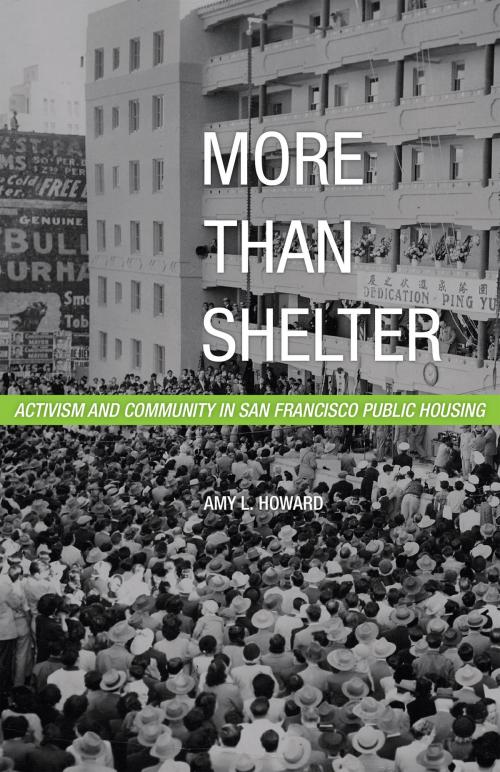More Than Shelter
Activism and Community in San Francisco Public Housing
Nonfiction, Social & Cultural Studies, Social Science, Sociology, Urban, History, Americas, United States, 20th Century| Author: | Amy L. Howard | ISBN: | 9781452941783 |
| Publisher: | University of Minnesota Press | Publication: | May 1, 2014 |
| Imprint: | Univ Of Minnesota Press | Language: | English |
| Author: | Amy L. Howard |
| ISBN: | 9781452941783 |
| Publisher: | University of Minnesota Press |
| Publication: | May 1, 2014 |
| Imprint: | Univ Of Minnesota Press |
| Language: | English |
In the popular imagination, public housing tenants are considered, at best, victims of intractable poverty and, at worst, criminals. More Than Shelter makes clear that such limited perspectives do not capture the rich reality of tenants’ active engagement in shaping public housing into communities. By looking closely at three public housing projects in San Francisco, Amy L. Howard brings to light the dramatic measures tenants have taken to create—and sustain and strengthen—communities that mattered to them.
More Than Shelter opens with the tumultuous institutional history of the San Francisco Housing Authority, from its inception during the New Deal era, through its repeated leadership failures, to its attempts to boost its credibility in the 1990s. Howard then turns to Valencia Gardens in the Mission District; built in 1943, the project became a perpetually contested and embattled space. Within that space, tenants came together in what Howard calls affective activism—activism focused on intentional relationships and community building that served to fortify residents in the face of shared challenges. Such activism also fueled cross-sector coalition building at Ping Yuen in Chinatown, bringing tenants and organizations together to advocate for and improve public housing. The account of their experience breaks new ground in highlighting the diversity of public housing in more ways than one. The experience of North Beach Place in turn raises questions about the politics of development and redevelopment, in this case, Howard examines activism across generations—first by African Americans seeking to desegregate public housing, then by cross-racial and cross-ethnic tenant groups mobilizing to maintain public housing in the shadow of gentrification.
Taken together, the stories Howard tells challenge assumptions about public housing and its tenants—and make way for a broader, more productive and inclusive vision of the public housing program in the United States.
In the popular imagination, public housing tenants are considered, at best, victims of intractable poverty and, at worst, criminals. More Than Shelter makes clear that such limited perspectives do not capture the rich reality of tenants’ active engagement in shaping public housing into communities. By looking closely at three public housing projects in San Francisco, Amy L. Howard brings to light the dramatic measures tenants have taken to create—and sustain and strengthen—communities that mattered to them.
More Than Shelter opens with the tumultuous institutional history of the San Francisco Housing Authority, from its inception during the New Deal era, through its repeated leadership failures, to its attempts to boost its credibility in the 1990s. Howard then turns to Valencia Gardens in the Mission District; built in 1943, the project became a perpetually contested and embattled space. Within that space, tenants came together in what Howard calls affective activism—activism focused on intentional relationships and community building that served to fortify residents in the face of shared challenges. Such activism also fueled cross-sector coalition building at Ping Yuen in Chinatown, bringing tenants and organizations together to advocate for and improve public housing. The account of their experience breaks new ground in highlighting the diversity of public housing in more ways than one. The experience of North Beach Place in turn raises questions about the politics of development and redevelopment, in this case, Howard examines activism across generations—first by African Americans seeking to desegregate public housing, then by cross-racial and cross-ethnic tenant groups mobilizing to maintain public housing in the shadow of gentrification.
Taken together, the stories Howard tells challenge assumptions about public housing and its tenants—and make way for a broader, more productive and inclusive vision of the public housing program in the United States.















